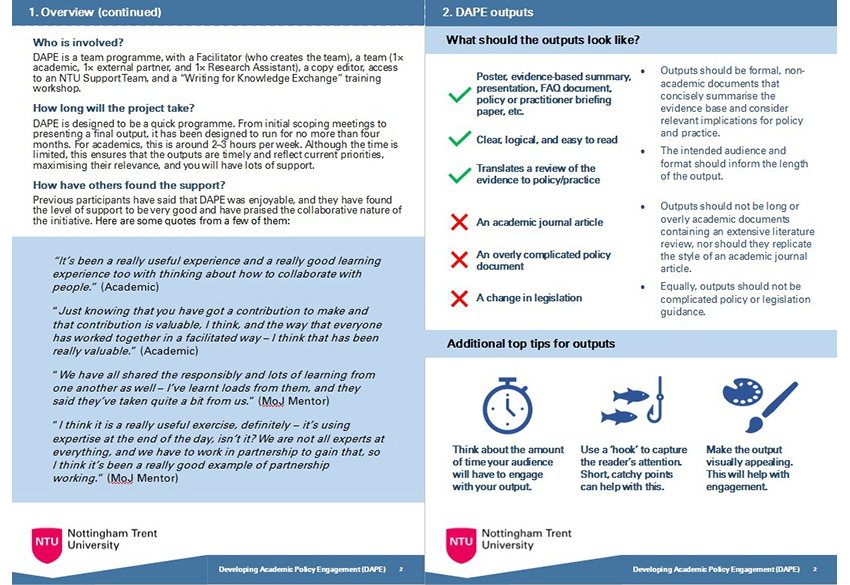What happens when you create a programme to link academics with policymakers?
Lessons from NTU's new DAPE programme with the Ministry of Justice and Her Majesty's Prison and Probation Service.
By Richard Pickford | Published on 22 April 2021
Categories: Nottingham Civic Exchange; Research; School of Social Sciences;

In December 2020 three small teams of colleagues at NTU joined a meeting with the Ministry of Justice (MoJ) and Her Majesty's Prison and Probation Service (HMPPS) staff to explore and tackle challenges they were facing. Over the course of four short months, they developed a series of resources together with their policy partners which showcased their work to understand and create solutions for the issue they had explored.
The teams made up of an academic member of staff and a research assistant (all current PhD candidates), working around their full-time roles, created valuable outputs that are now being shared and discussed across the MoJ and HMPPS.
The projects looked at the available evidence on:
- the link between social support and self-harm and suicide risk. Both community and prison-based literature was drawn upon.
- the barriers to, and facilitators of, people in contact with probation engaging with health services.
- the disproportionality in reoffending rates by ethnic minority groups.
Each team created policy-focused outputs that could be used by specific audiences that they had identified. They took the form of presentations, posters and evidence reports and can all be found below.
To support colleagues to engage with policy and practitioners DAPE took the teams through an eight-stage process to guide them through a new way of working. DAPE aims to support colleagues to develop new skills and build confidence in sharing work with a non-academic audience. We believe the approach can be mirrored in other government departments, agencies, sectors and organisations. The programme shared the building blocks for engagement and presenting to a new audience and highlighted that colleagues already had the knowledge and skills to undertake this work.
We have conducted a review of the programme which highlights the value of this approach for both colleagues and partners which reinforces our aim to provide mutually beneficial projects with partners in the School of Social Science. Despite the short time frame and concerns when they began all parties feel they benefited from the shared experience and the material that has been produced.
I think with this initiative it was very clear from the get-go you know we were saying what are we doing who is it for, who is the audience where is that output going to be so immediately, I felt like I knew what I was working towards
DAPE participant
I’ve learnt a lot just because the academics have bought in an awful lot of research evidence to my attention
DAPE participant
DAPE forms part of a wider body of work to encourage our staff to share their work beyond academic journals and conferences and to have the confidence to inform policy and practice debates linking into Nottingham Civic Exchanges role across the School to support knowledge exchange and policy influence in areas of research and practice expertise. We will be developing ways to showcase this work further and have created a DAPE mini-guide to help others explore how we did this work.
DAPE was kindly supported to do this work by an internal grant that allowed us to fund the research assistant time alongside some bespoke copy-editing advice. The project team (Dr Karen Slade and Rich Pickford), MoJ and HMPPS staff and the academics undertook this project around their current roles.
The project team and research assistants are currently developing an academic paper on DAPE and will be sharing their experiences through a report and presentation. They are also exploring how DAPE can be expanded and shared across NTU and will be seeking support to do this.
If you would like to know more about DAPE or our work with external partners to inform practice and policy, please contact Nottingham Civic Exchange.
The DAPE Team
Project Team | Jane Slater | ||
Group One Supporting work on self-harm and suicide | Group Two Exploring reoffending and ethnic minorities | Group Three Barriers and opportunities in health and wellbeing for probation service users | |
Academic Lead | |||
Research Assistant | Lindsay Thurston | Rahmanara Chowdhury | Jordan Clayton |
Outputs | |||
MoJ/HMPPS link | Jess Bond and Emily Wright | Laura Emmerson | Imogen Schartau |
Copy Editor | Chris Martin | ||
Nottingham Civic Exchange
Nottingham Civic Exchange has been established by Nottingham Trent University to maximise research, policy and practical impact by bringing together university expertise with partners seeking to address the needs of communities. Nottingham Civic Exchange acts as a resource to look at social and economic issues in new ways. This means facilitating debate, acting as a bridge between research and policy debates, and developing practical projects at a local, city and regional level.
Visit our website - www.ntu.ac.uk/nce Contact us - notts.civicex@ntu.ac.uk Follow us - @NottsCivicEx